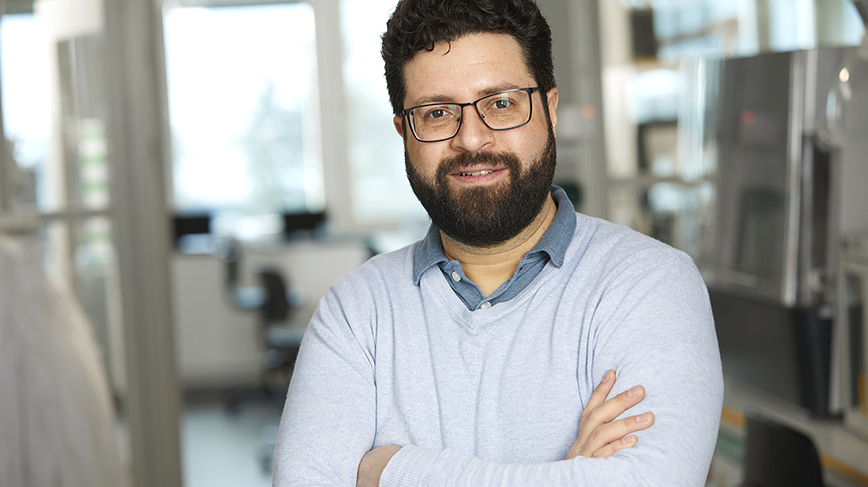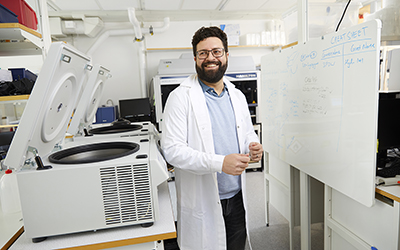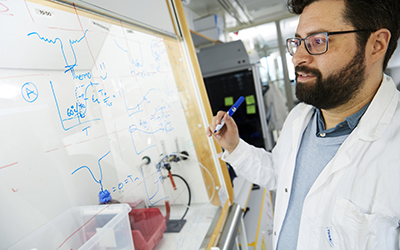KTH Alum of the Year 2021 wants to make the chemical industry green

As a KTH student he discovered that environment friendly chemicals production was not available for major industry. He is now head of EnginZyme, a company that develops environment friendly chemical engineering for mass production. “We aim to revolutionise the chemical engineering sector,” says Karim Engelmark Cassimjee, winner of the KTH Alum of the Year Award 2021.
Engelmark Cassimjee is an innovator and co-founder of EnginZyme, a chemicals company that is based on an idea he came up with when he was a doctoral student at KTH. The company is currently developing a technology in its laboratories that researchers hope will contribute to making future industrial production significantly greener.

How did you come up with the basic idea behind EnginZyme?
“When I was a student at KTH I could see that environment friendly enzymes that produce different chemicals in a sustainable way could not be used in industrial manufacturing. The processes were considered to be far too expensive and were therefore not used in large scale production.
In chemical manufacturing, fossil starting materials are usually employed that are converted into products with the help of catalysts, that in turn, are often heavy metals requiring high temperatures.
These types of processes have a big negative impact on the environment, as they are very energy intensive and create hazardous waste.
“Natural enzymes are found in all forms of life – in our bodies, in trees, in bacteria and so on. These natural enzymes enable fantastically advanced chemistry that does not require high pressure, high heat or environmentally harmful additives,” Engelmark Cassimjee explains.
Enzymes will meet the needs of the industry
However, the industrial processing of these natural enzymes is difficult and costly today, and therefore not used on any great scale.
“We are reformulating both the enzymes and the processes so they can be adapted to the needs of the industry. These enzymes can now be used in way that is at least as efficient as the catalysts that the industry is familiar with, which will also enable the use of bio-based starting materials. In so doing, today’s fossil based manufacturing processes can be phased out.
“The reset that is required for today’s technology would entail a large investment, and my thesis is that you cannot get industry to pay more for greener alternatives. To persuade producers to choose the environment friendly path, we need to get costs down instead. And we have to prove that our technology works.”

EnginZyme hopes to be able to launch an initial production process for the industry in 2022.
“We are starting in one corner and working our way outwards towards the end goal – for example to create environment friendly chemicals for the sustainable production of plastic products , that are entirely free of fossil substances.”
Engelmark Cassimjee estimates the time from lab to factory will be about three years.
What is your vision for the future?
“When we can get enzymes to work in a factory environment, this will open up a whole world of new products – when you think of all the materials found in nature, we will no longer be locked into a handful of chemical product materials. One vision I have is to be able to replace environmentally harmful parts of concrete production, a major climate villain, with natural materials. This can make the construction industry far more sustainable.
He also envisages big possibilities within medical products and electronics production as well.
“Our hope is that many countries around the world can reduce their imports of chemicals and instead supply local factories with bio-based substances that can be sourced from their own region.”
Engelmark Cassimjee emphasises the importance of feeling professional pride as an engineer.
“As engineers, we are educated to build things. We have a responsibility as builders, a responsibility to make the world a better place. Not simply to accept work orders, but also in ensuring new constructive solutions can be developed and created.
“I would like to tell engineers of the future that being able to assemble things is a strength. To manage is a gift. And when you have learnt the basics, it is important that you build on these in new ways.”
Katarina Ahlfort
Photo: Fredrik Persson
